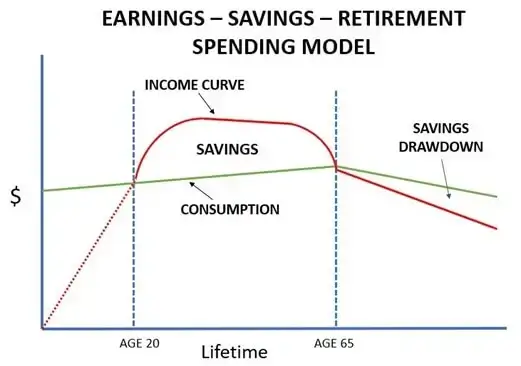
What Can Gold Do for Your Retirement? “Commodities such as gold and silver have a world market that transcends national borders, politics, religions, and race. A person may not like someone else’s religion, but he’ll accept his gold.”
Robert Kiyosaki, author Rich Dad, Poor Dad
Investment lore focuses on success stories, individuals who gain great wealth by following a recommended system of asset analysis and decision-making. Thousands of experts are eager to help investors “beat the market” and grow rich – for a fee.
Investment advice is lucrative; hedge fund manager John Paulson reportedly earned a personal fortune in the billions managing other people’s money.
According to the New York Times, his clients did not fare as well, the value of their investments falling from $36 billion in 2011 to under $10 billion in 2017 ($6 billion in 2018, according to Forbes).
A cursory review of investment systems reveals that all are profitable some of the time, but none are profitable all of the time. All investments experience periods of popularity due to a succession of high returns. Unfortunately, the same investments fall out of favor and drop in value as quickly as they arise.
This cycle of ups and downs is “volatility.” An investor caught on the wrong side of the cycle experiences devastating loss, “the full flavor of losing money cannot be conveyed by literature,” according to Fred Schwed, Jr.
He was an investment broker during the Great Depression and subsequent market collapse. In his book Where Are the Customers’ Yachts, he writes, “Speculation is an effort, probably unsuccessful, to turn a little money into a lot. Investment is an effort, which should be successful, to prevent a lot of money from becoming a little.”
The Critical Importance of Retirement Funds
Most people have a limited number of earning years, typically from their late teens to their mid-60s. During that time, they must earn enough to pay for daily living expenses (shelter, food, transportation, education, and taxes) and save enough to cover the rest of their lives after ceasing to work. Accordingly, most people divert a portion of current income to save and invest until needed at retirement. Their standard of living after retirement is dependent on the value of savings accumulated during their income-earning years.

Each saver bears the risk that adverse conditions – recessions, depressions, stock market crashes – might significantly reduce their savings (and their subsequent lifestyle) when it is needed most. Managing the risk of a potential decline in retirement savings, though often overlooked, is critical. Though past performance is never a guarantee of future performance, a gold IRA account has historically helped counter the risk of volatility in securities, real estate, and other intangible assets.
History of Gold’s Attraction
Gold was once the most desirable asset a person could own, being sought as early as 3500 B.C. Its unique physical properties – impervious to rust, malleability, beauty – combined with its rarity has ignited wars, prompted great expeditions, and influenced global economic theories:
- Egyptians capped their great pyramids (3000 B.C.) with gold and buried the mummies of great leaders in gold sarcophagi.
- Gold from the conquered Incan empire (1532-1572) in South America fueled Spain’s rise to world power.
- The belief that ownership of gold established a nation’s wealth underscored the Mercantilism economic system of Europe from the 16th to the 18th centuries.
- The San Francisco Gold Rush of 1849 prompted the settlement of the western United States.
Gold continues to be highly valued by investors as a highly reliable store of value that has remained consistent for centuries. As such, it pays to research what can gold do for your retirement. In times of unrest, investors add gold to their portfolios – including self-directed IRAs and 401(k)s – to protect retirement values built over decades. In many ways, gold functions like insurance for an investment portfolio because it typically retains or increases its monetary value.
5 Reasons to Own a Gold IRA
The ownership of gold can be controversial. Especially for those whose livelihoods depend on the upward growth of securities, real estate investments, and other exotic assets like cryptocurrencies and trading cards. To many, gold is the stodgy old investments of their grandfathers. They advocate that the path to money requires high risk, high returns in a future of ever-expanding economies and technological miracles. In many ways, they resemble the sheiks and flappers of the 1920s who were sure the good times would never end.

They did, and Americans turned to the one investment that has kept its value for century after century: gold.
Modern investors should consider the acquisition of gold in their retirement portfolios for the same reasons their ancestors bought gold in their day:
Limited Supply
Gold is a finite resource. Experts estimate that approximately 244,000 tons have been discovered in the history of man. Three-quarters of the amount has been mined, refined, and is held by governments and individuals worldwide. Approximately 57,000 tons remain underground and are available only with an expensive and lengthy process. It can take five to 10 years to bring a new mine into production.
A fundamental theory of economics is the law of supply and demand. When demand goes up, and supply remains the same or decreases, price increases and vice versa. Since the supply of gold is finite, the price for gold will escalate when demand increases due to economic worries.
What Can Gold Do for Your Retirement?

Holding a diversified group of assets is a time-tested method of reducing volatility, i.e., investment risk, in a portfolio. Peter Bernstein, the author of 10 books on economics and finance and the founding editor of the Journal of Portfolio Management, noted that “diversification of risk matters not just defensively, but because it maximizes returns as well because we expose ourselves to all of the opportunities that there may be out there.”
Unfortunately, many investors do not recognize that diversification refers to asset classes in addition to individual securities in a portfolio. In severe downturns, investors do not discriminate between good and bad stocks in their panic to save as much as they can. Owning gold to a portfolio reduces investment risk and counterbalances falling values in the stock market.
Inflation Protection
Gold has historically been an excellent hedge against inflation. When fiat (government-issued) currency loses its purchasing power to inflation, gold’s value-priced in that currency units rises along with everything else. Over the past 50 years, investors have seen gold prices soar and the stock market plunge during high-inflation years. Gold typically holds its value when the local currency loses value due to inflation.
Deflation Protection

Today, investors who have never experienced deflation and assign stories of the 1930s Great Depression to myth. They assume a similar event will not be repeated. Deflation is the opposite of inflation, a period where demand for products drops, unemployment rises, and credit disappears. Many believe that World War II resulted from global deflation and ultimately the key to recovery.
Before the 21st century, deflation was a regular economic event. Since the end of WWII, deflation has occurred a single time between 2007 to 2009. Many financial experts liken deflation to a violent tornado. It is difficult to predict but delivers catastrophic damage when it arrives.
During deflationary periods, people turn to gold to retain their value since other assets, including government currencies, lose value. The demand for gold and its hoarding in the Depression in return for dollars forced the President to outlaw private ownership of gold. Will deflation occur again? No one knows for sure, but a deflationary period will certainly reoccur if history is a guide.
Currency Devaluation

The U.S. dollar has been the world’s reserve currency since the Bretton Woods Agreement in 1944 due to global governments’ faith that the United States will always pay its debts. Recent events, including an unprecedented $33 trillion+ national debt, increasing economic competition from China, internal political conflicts, and the effects of the coronavirus pandemic have shaken faith in the dollar. In the last decade, the dollar has generally declined in value against foreign currencies.
The effect of a declining dollar is to increase the costs of imported goods to America. As prices increase due to the decline and punitive trade tariffs, American consumers will likely reduce discretionary spending. They'll also divert higher proportions of income to essential consumption, and liquidate savings. Subsequently, the country’s GDP and the value of public companies will stagnate or decline.
Final Thoughts
Whoever said that the only things in life that are certain are death and taxes wasn't spot on. They overlooked that each person reaches a stage in life where they cannot or choose not to work. Many will be dependent on government social programs, their children, or charity for basic needs. Others anticipate retirement and diligently save during their earning years to be independent and enjoy their chosen lifestyle.
No one can avoid future risks, but they can manage those risks by their decisions today. Maintaining gold in a retirement portfolio is akin to buying fire insurance on your home.
It may be unlikely that your house would burn down, but few people would decline protection against a devastating loss. Owning gold provides peace of mind in a way no other asset can.